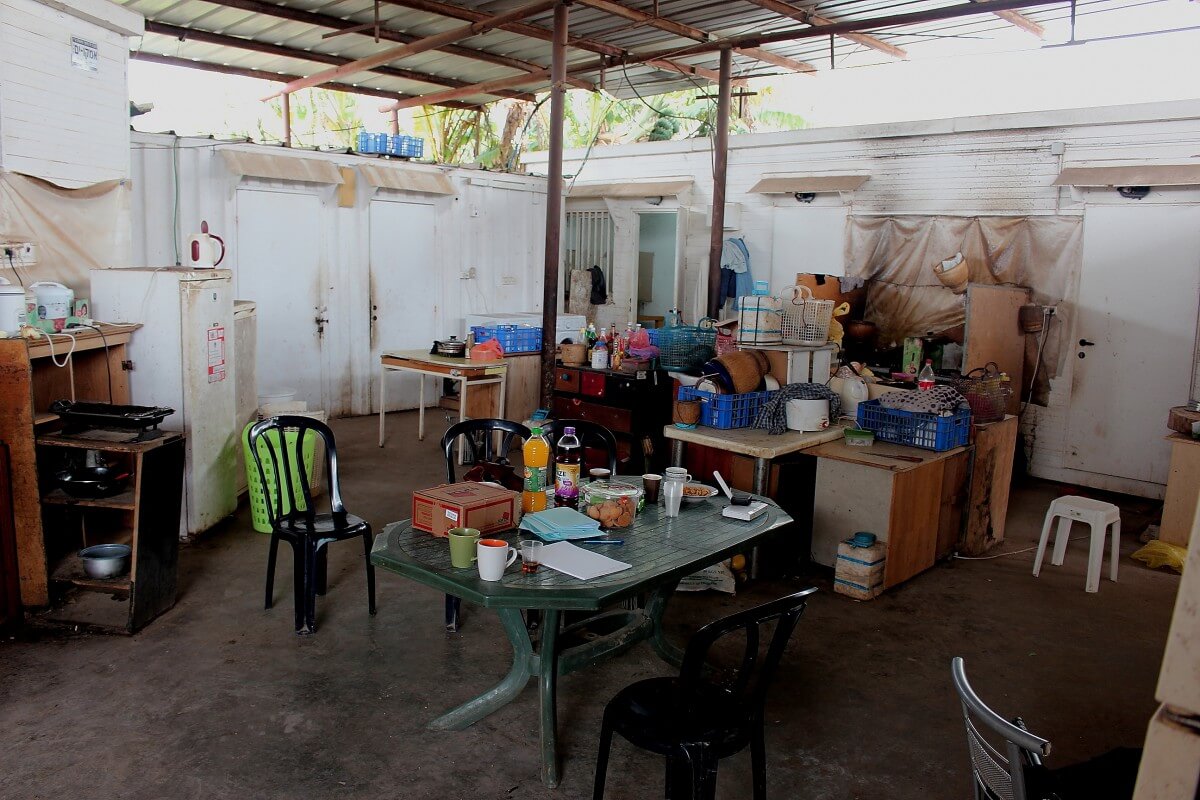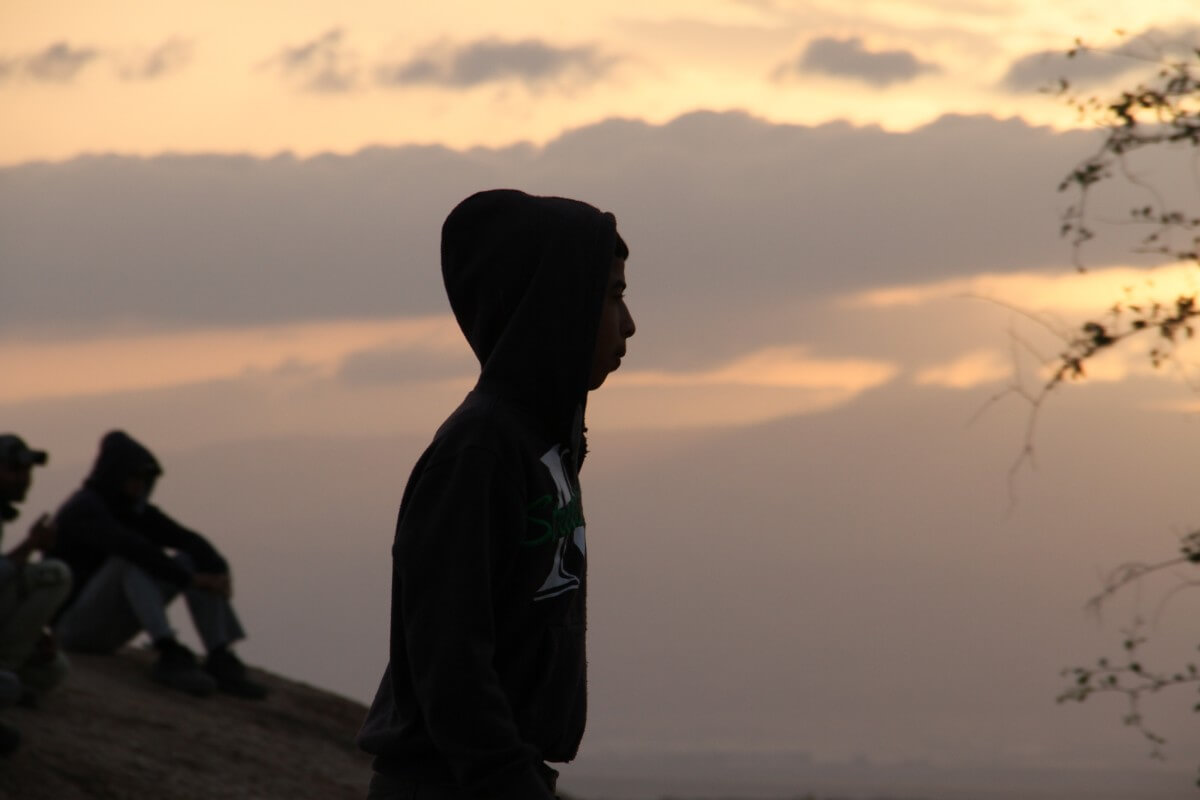“This is not what I expected,” Dusit Doting says as he stands outside the white shipping container that he now calls home. The other Thai agricultural workers standing around Doting appear to agree with the sentiment. They work long hours, in often dangerous and hazardous situations, and all for less than the legal Israeli minimum wage of 25 NIS an hour.
Thai workers make up 95% of the workforce on Israeli farms and are tied to the sector as part of their visa contract. Unable to speak Hebrew, read work contracts and pay slips, they frequently find themselves exploited by farmers who use them as a cheap labor force.
Exploitation of Thai workers, Noa Shauer, coordinator of agricultural workers at workers’ rights organisation Kav LaOved, told Mondoweiss, is the norm.
Mondoweiss visited an Israeli farm (Moshav) in Lakish, in the northern Negev, and found a dozen Thai workers living in squalid conditions, being paid less than minimum wage, and working without safety equipment despite handling dangerous chemicals and pesticides.

Thai agricultural workers often live in accommodation that is unfit for living such as this shipping container. (Photo: Matthew Vickery)
The visit to the farm was conducted in secret without the farmer’s knowledge to ensure there were no ramifications for the workers. Workers have been fired, had pay taken away, and threatened with deportation in the past for speaking out about their working and living conditions.
“I have a friend who got ill from the spray,” Sutep Sesubang says while standing in the living quarters that he shares with a dozen other Thai workers. The area, which comprises of four shipping containers, is dirty, exposed to the elements and connected by corrugated iron and sheets of plastic. It floods when it rains.
Sesubang hands over a small paper mask – it’s his only protection from chemicals when he’s spraying the fields.
“We don’t have anything to keep us safe. This mask is too simple, we have to cover the rest of our faces with our clothes to stop getting ill.”
Illness from chemicals is not the only hazard. Doting broke his leg when he fell while tending to grapevines on the farm. He was refused sick pay. Despite not being fully recovered, he had to return to work within three weeks because he needed the money,
“I had to go back to work quickly, I wasn’t being paid. I think the farmer did this on purpose so I had to work even if I was not recovered,” Doting says. “I’m sure the conditions are supposed to be better, not like this.”
Doting and the other Thai workers on the farm, say they get paid 18 NIS (around $4.50) an hour, 7 NIS less than they should.
However they believe that what they are told they are being paid is still much more than they actually receive. The farmer refuses to give them their complete wage at the end of the month, instead giving them a small portion of it that can cover expenses. The rest is sent back to their families in Thailand. Whether the rest of that money is being sent in it’s totality or not, is unknown.
By limiting the money the workers are given, the farmer effectively imprisons them within the farm. It’s a common practice in the country, ensuring workers have no money to leave, travel elsewhere, or find another agricultural job in Israel.
Shauer says that the government is well aware of the abuses taking place, but that it prefers to ignore them – by doing so, the government is giving the agricultural sector a subsidy, through cheap labor.
“The Israeli government definitely knows about this sort of thing,” Shauer says. “By not enforcing labor law, by allowing this cheap labor, the government is giving the [agricultural] sector its subsidy. The subsidy is looking the other way.”
Thai workers aren’t the only exploited work force on Israeli farms. In the illegal Jordan Valley settlements, Palestinian workers are employed on mass on meager wages. Many are children.
“The Thai workers, they pay them more money,” Yazan, a 15-year-old from Fusayll village tells Mondoweiss. “They get treated better, they get given more money. I’ve never seen them [settler farmers] shouting at the Thai workers. They even get the better jobs on the farm. The harder jobs go to Palestinians.”
Several hundred children are estimated to be working on settlement farms picking peppers, onions, dates, and tomatoes in the Jordan Valley, often in exhausting and hazardous circumstances.

A Palestinian child worker at the end of his shift at Tomer settlement. (Photo: Hamza Zbeidat)
Yazan started work picking sweet peppers on a farm in Tomer settlement at the age of 14. He works 8 hours a day for 70 NIS, around 9 NIS an hour – 16 NIS less than the Israeli minimum wage. The exhausting hard labor has already caused health problems for the 15-year-old who complains of back pain from toiling the fields.
The teenager talks of a climate of fear at the farm he works in, where the settler farmer frequently screams at the workers, and threatens to fire them at will.
Employing a child aged fifteen in a job which could damage their health is illegal according to Israeli and International law. Employing anyone 14 or under, is completely forbidden.
Yazan who has been working since the age of 14, says there are at least 20 children younger than him working on the farm.
Human Rights Watch, in a report released last year, documented children as young as 12 being employed on settlement farms in the Jordan Valley.
When asked whether he knew what the Israeli minimum wage was, Yazan said he knew it was 25 NIS an hour, but when he asked his employer about this previously, he was told that if he made a fuss about it he would be fired.
“They don’t care about our salaries, do you think they will care about our age?“ Yazan says when asked about child labor in the settlements. “It’s not about rights. It’s just because we’re Palestinian.”
Hamza Zbeidat, the project coordinator in the Jordan Valley for MA’AN, told Mondoweiss that child labor in the settlement farms was widespread. The age of the worker was of no relevance to settler farmers, but instead, “what he [the farmer] does care about, is the numbers [profit] at the end of the day.”
Like Thai workers, there is little to no training for use of heavy machinery, and no safety equipment when using pesticides and chemicals. Illness and sickness is common.
Palestinian villages in the Jordan Valley, such as Fusayll where Yazan’s family live, sit in Area C – a vast area of land under the complete jurisdiction of the Israeli military. Palestinian families who would previously have made an income from tending to the land, and herding sheep and goats, have had that income stream taken away from them. At the same time settlement farms have expanded as more land has been annexed by Israel for its settlement project.
The outcome has been a situation where both Palestinian adults and children have had to find work to put food on the table. Settlement farms that neighbor Palestinian villages have now become the main employment option, and are more than happy to exploit an impoverished Palestinian population with high unemployment rates.
“This is our land and they [settlers] have to leave,” Yazan says with sadness in his voice. “If they were not here we would be able to own the land and cultivate it, and make an actual income. I wouldn’t have to work where someone is shouting at me all the time, and controlling me in this way.”
Source Article from http://mondoweiss.net/2016/02/israeli-farms-exploit-thai-workers-and-palestinian-children-as-government-looks-the-other-way/
 RSS Feed
RSS Feed















 February 24th, 2016
February 24th, 2016  Awake Goy
Awake Goy  Posted in
Posted in  Tags:
Tags: 













